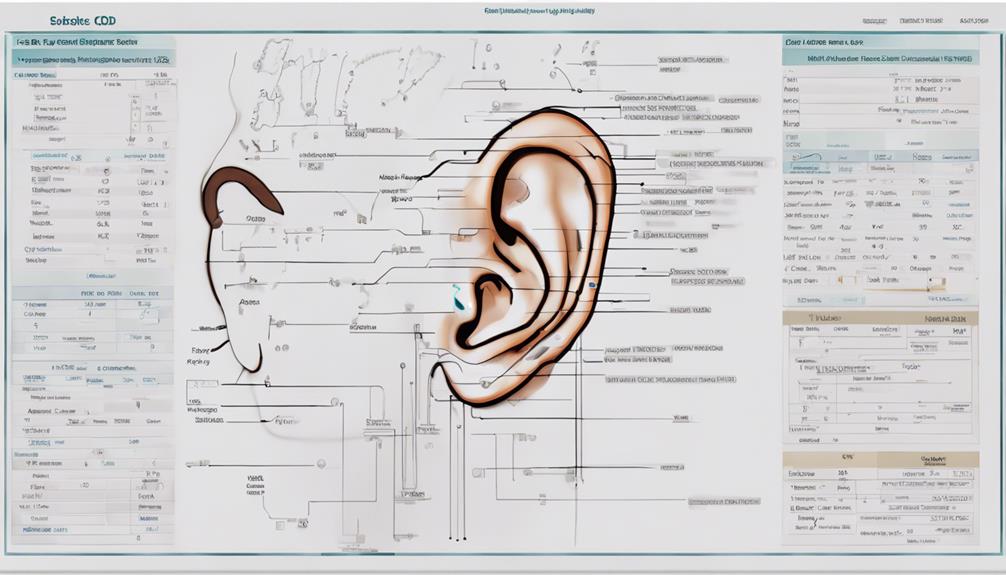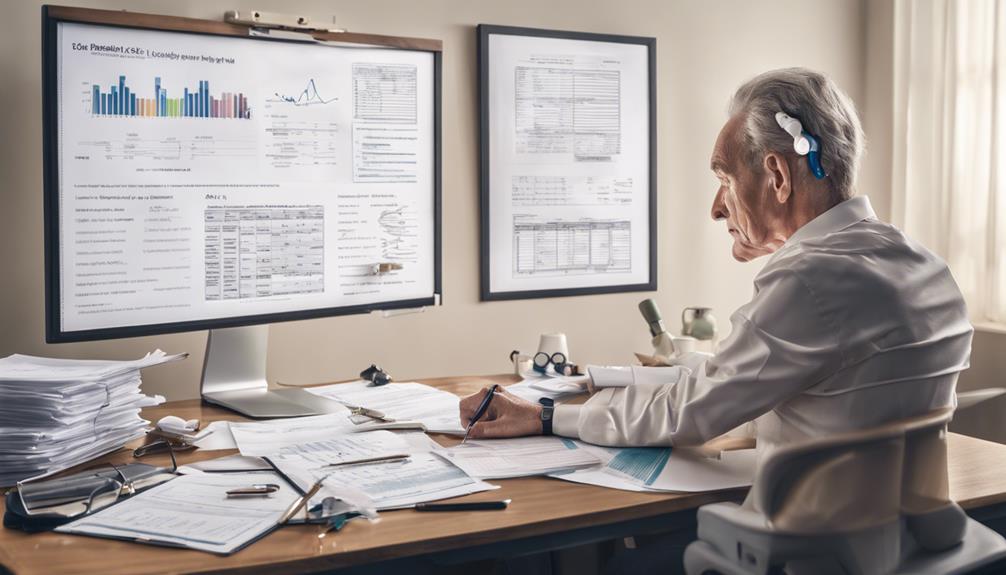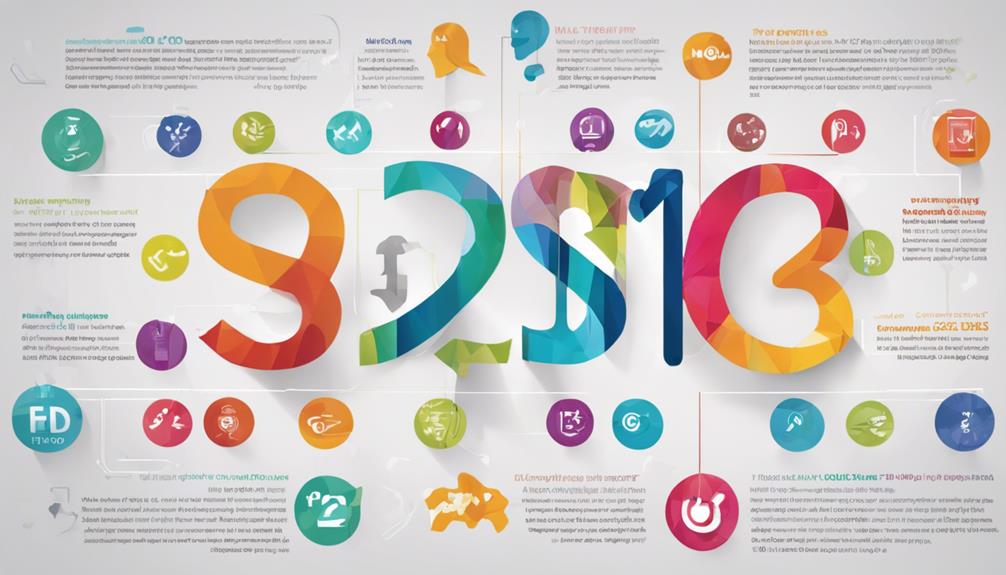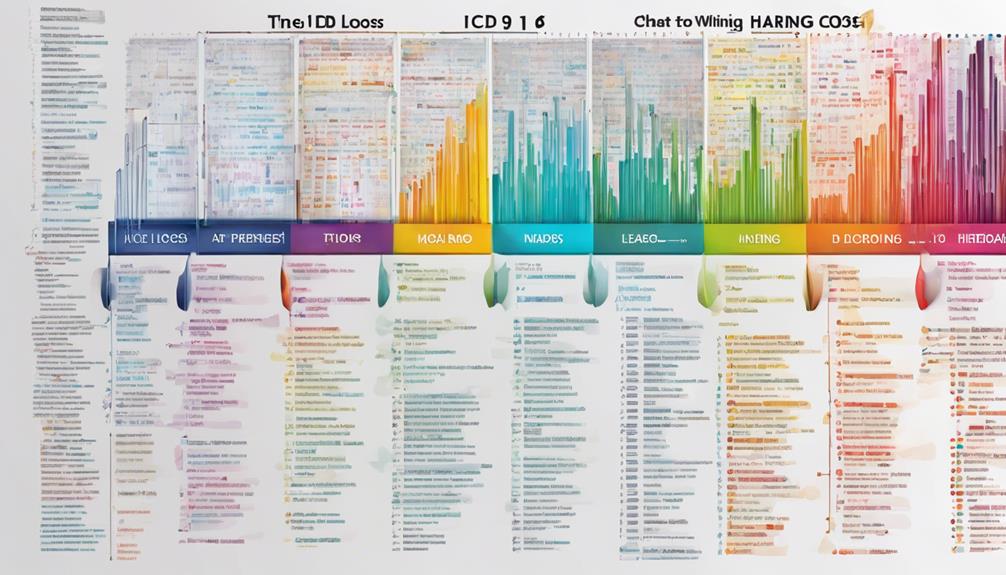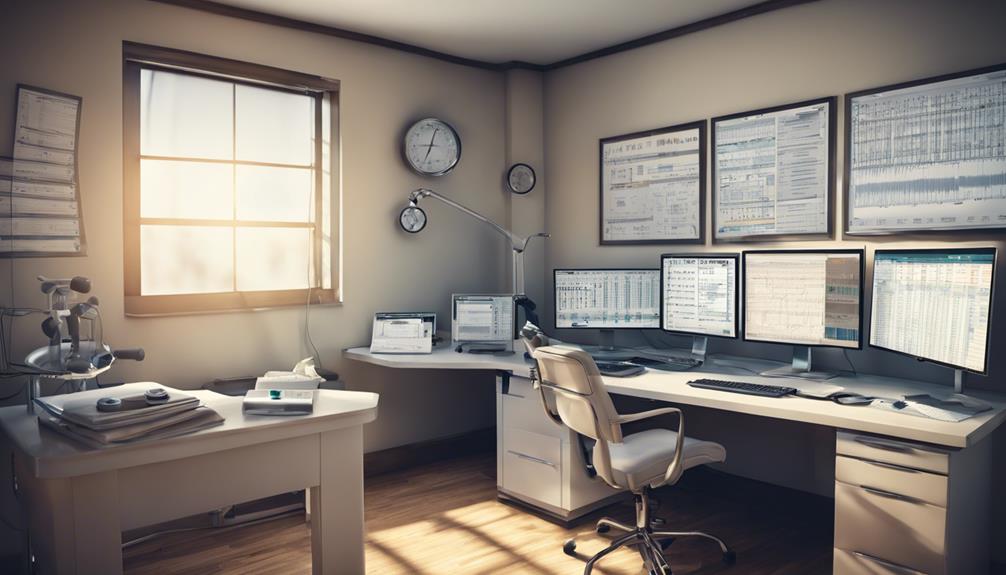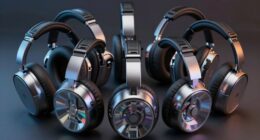Do you think that documenting hearing loss in the left ear with ICD codes is as easy as learning your ABCs?
Well, let me tell you, it's not just about picking a random code and calling it a day. There are nuances to consider, complexities to navigate, and guidelines to follow.
But fear not, as we unravel the intricacies of capturing hearing loss in the left ear with precision using the right ICD codes, you'll soon realize the importance of this process in the realm of healthcare documentation.
Stay tuned for insights that will elevate your understanding of this crucial aspect of medical coding.
Key Takeaways
- Utilize ICD code H91.22 for sudden idiopathic hearing loss in the left ear.
- Include laterality for precise medical records and billing accuracy.
- Adhere to ICD-10-CM guidelines for documenting left ear hearing loss.
- Thorough documentation supports proper billing and treatment planning.
Importance of ICD Codes for Hearing Loss
The utilization of ICD codes plays a critical role in accurately documenting and categorizing hearing loss, particularly in the context of the left ear. When it comes to diagnosing hearing loss, understanding the different types is essential. Sensorineural hearing loss affects the inner ear or auditory nerve, conductive hearing loss involves issues in the outer or middle ear, while mixed hearing loss is a combination of both. Proper identification through ICD codes ensures appropriate treatment plans are initiated promptly.
Medical coding using these codes is crucial for billing purposes and insurance reimbursement related to cochlear implants or auditory processing evaluations. By accurately coding for conditions like sudden idiopathic hearing loss in the left ear with codes such as H91.22, healthcare providers can ensure effective communication with insurance companies and other healthcare professionals. This precision in coding not only aids in proper documentation but also helps in tracking the progress of treatment and the overall management of patients with hearing impairments.
Specific ICD Codes for Left Ear

With a focus on precision and accuracy in medical documentation, understanding the specific ICD codes designated for left ear conditions is paramount. When documenting sudden hearing loss in the left ear, the specific ICD-10-CM code to utilize is H91.22. This code is part of the H91 subcategory, specifically created for sudden hearing loss cases. By employing ICD-10-CM code H91.22, healthcare providers can accurately capture and report instances of left ear hearing impairment. It's imperative to include the laterality, specifying the affected ear, to ensure thorough and precise medical records.
Using the correct ICD code, such as H91.22, for left ear conditions like sudden hearing loss is crucial for proper billing and coding procedures. Detailed documentation with specific codes facilitates accurate identification of the condition, streamlines billing processes, and supports appropriate reimbursement. Healthcare professionals should be diligent in selecting the precise ICD codes to reflect the exact nature and location of the patient's hearing issues, particularly when it pertains to the left ear.
Coding Guidelines for Accuracy

To ensure precise coding accuracy for documenting hearing loss in the left ear, healthcare providers must adhere closely to the ICD-10-CM guidelines for diseases of the ear and mastoid process.
When using an ICD-10 code for sudden idiopathic hearing loss specifically affecting the left ear, it's essential to reference code H91.22. Differentiating between the left ear, right ear, or unspecified laterality is crucial to specify the affected side accurately.
By following the chapter-specific guidelines for diseases of the ear and mastoid process, healthcare professionals can ensure accurate coding practices. It's imperative to cross-reference exclusions to avoid coding errors related to conditions such as abnormal auditory perception, impacted cerumen, or psychogenic deafness.
Adhering to the ICD-10-CM guidelines will enable providers to provide precise and detailed documentation of hearing loss in the left ear, facilitating better patient care and treatment outcomes.
Billing Considerations for Hearing Loss
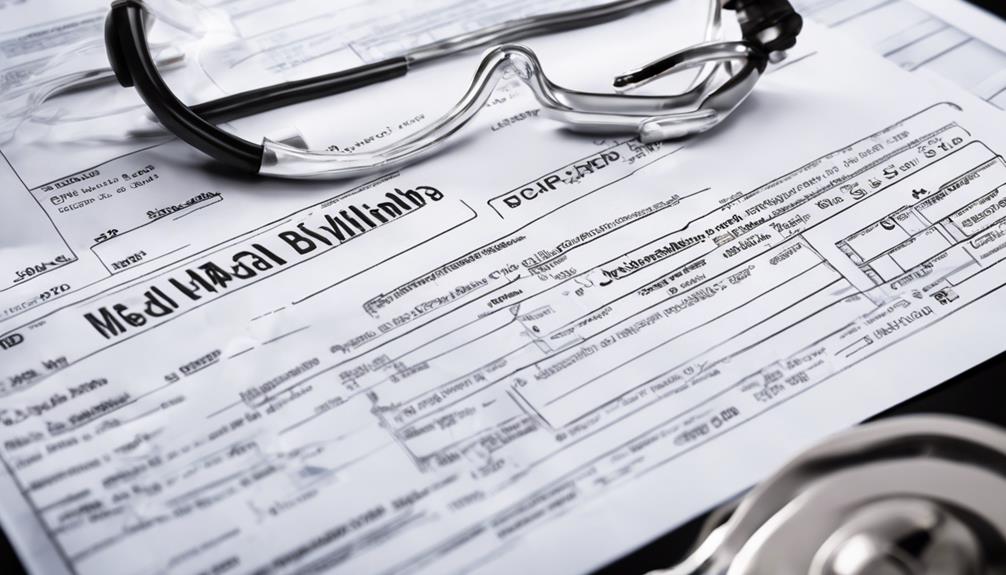
For accurate billing of hearing loss, precise documentation with appropriate ICD codes is crucial. When coding and billing for auditory issues in the left ear, specificity is key. Utilizing the ICD-10-CM code H91.22 for sudden idiopathic hearing loss in the left ear ensures accurate representation.
It's essential to distinguish between left ear, right ear, and bilateral hearing loss to prevent billing errors. Documenting the type of hearing loss, its laterality, and any associated risk factors or conditions is vital for supporting medical necessity and justifying reimbursement.
By adhering to coding guidelines and accurately documenting these details, healthcare providers can avoid claim denials and facilitate proper reimbursement for the services rendered. Medical billing relies heavily on the accuracy of the information provided, making thorough and meticulous documentation a cornerstone of the billing process.
Ensuring that all aspects of the auditory condition in the left ear are clearly documented is fundamental to successful billing and reimbursement processes.
Examples of ICD Code Documentation
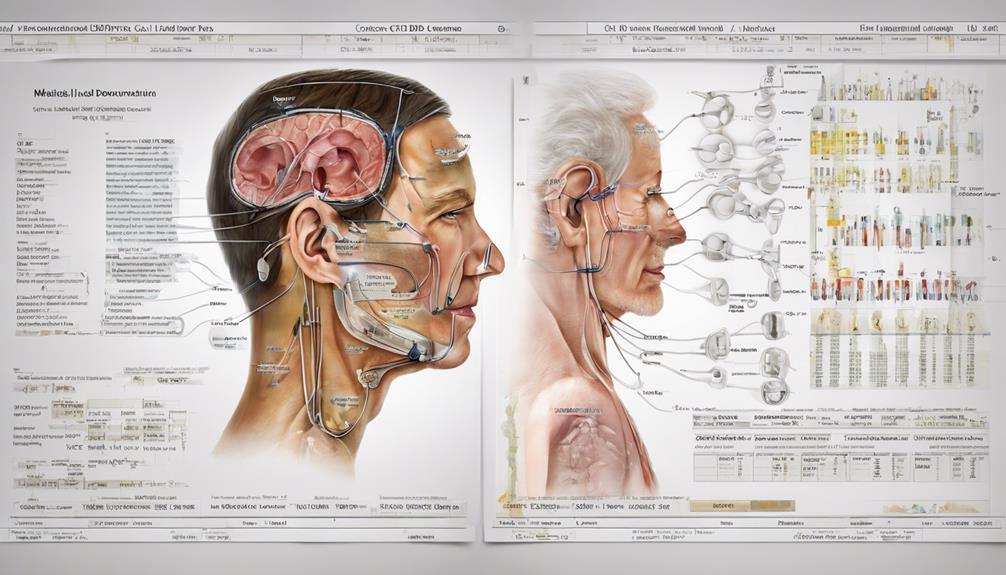
Examples demonstrating the accurate documentation of ICD codes for sudden idiopathic hearing loss in the left ear are crucial for proper medical billing. When coding for this condition in the ICD-10-CM, it's essential to use the specific code H91.22 to indicate the occurrence in the left ear. Emphasizing laterality in the clinical notes is imperative for accurate coding, ensuring that the specificity required for billing purposes is met. Clinical documentation should support the use of the precise ICD code for left ear hearing loss, excluding conditions such as abnormal auditory perception or psychogenic deafness.
Adhering to chapter-specific guidelines for coding sudden idiopathic hearing loss in the left ear is vital to maintain consistency and accuracy in medical records. By following these guidelines and accurately documenting the condition, healthcare providers can facilitate seamless billing processes and ensure appropriate reimbursement for services rendered. Remember, proper coding not only aids in billing but also enhances overall patient care by providing a comprehensive understanding of the patient's auditory health status.
Frequently Asked Questions
What Is the ICD-10 Code for Hearing Loss in the Left Ear?
We know the ICD-10 code for hearing loss in the left ear is H91.22. It's crucial for accurate documentation.
This code falls under Diseases of the ear and mastoid process.
Remember, H91.22 excludes conditions like abnormal auditory perception.
Using this code ensures precise reporting.
What Is the ICD-10 Code for Left Ear Sound?
When discussing left ear sound in terms of ICD-10 codes, it's essential to consider the specific nature of the auditory issue.
The code H93.25 is used for abnormal auditory perception, capturing the nuances of sound-related symptoms.
This code falls under the Diseases of the ear and mastoid process category, providing a distinct identifier for left ear sound abnormalities.
Proper documentation using H93.25 ensures accurate reporting and appropriate management of left ear sound concerns.
What Are the Three 3 Types of Hearing Loss?
When it comes to hearing loss, there are three main types to consider: conductive, sensorineural, and mixed.
Conductive hearing loss affects sound transmission in the outer or middle ear, while sensorineural hearing loss stems from inner ear or auditory nerve damage.
Mixed hearing loss combines elements of both conductive and sensorineural issues.
Accurately identifying the type of hearing loss is essential for proper diagnosis and treatment planning.
What Is Hearing Loss in the Inner Ear?
Hearing loss in the inner ear, or sensorineural hearing loss, occurs due to damage in the inner ear structures or the auditory nerve, leading to permanent impairment. Causes include aging, loud noise exposure, genetics, infections, and medications.
Diagnosis involves audiometric testing. Treatments like hearing aids or cochlear implants may be necessary.
Properly documenting sensorineural hearing loss with ICD codes is crucial for accurate medical billing.
Conclusion
In conclusion, utilizing the specific ICD code H91.22 for sudden idiopathic hearing loss in the left ear is crucial for accurate documentation and billing purposes.
By following coding guidelines and specifying the laterality and type of hearing loss, healthcare providers can ensure proper reporting and reimbursement.
Remember, the right code ensures the right treatment, so be precise and detailed in your documentation to paint a clear picture of the patient's condition.

